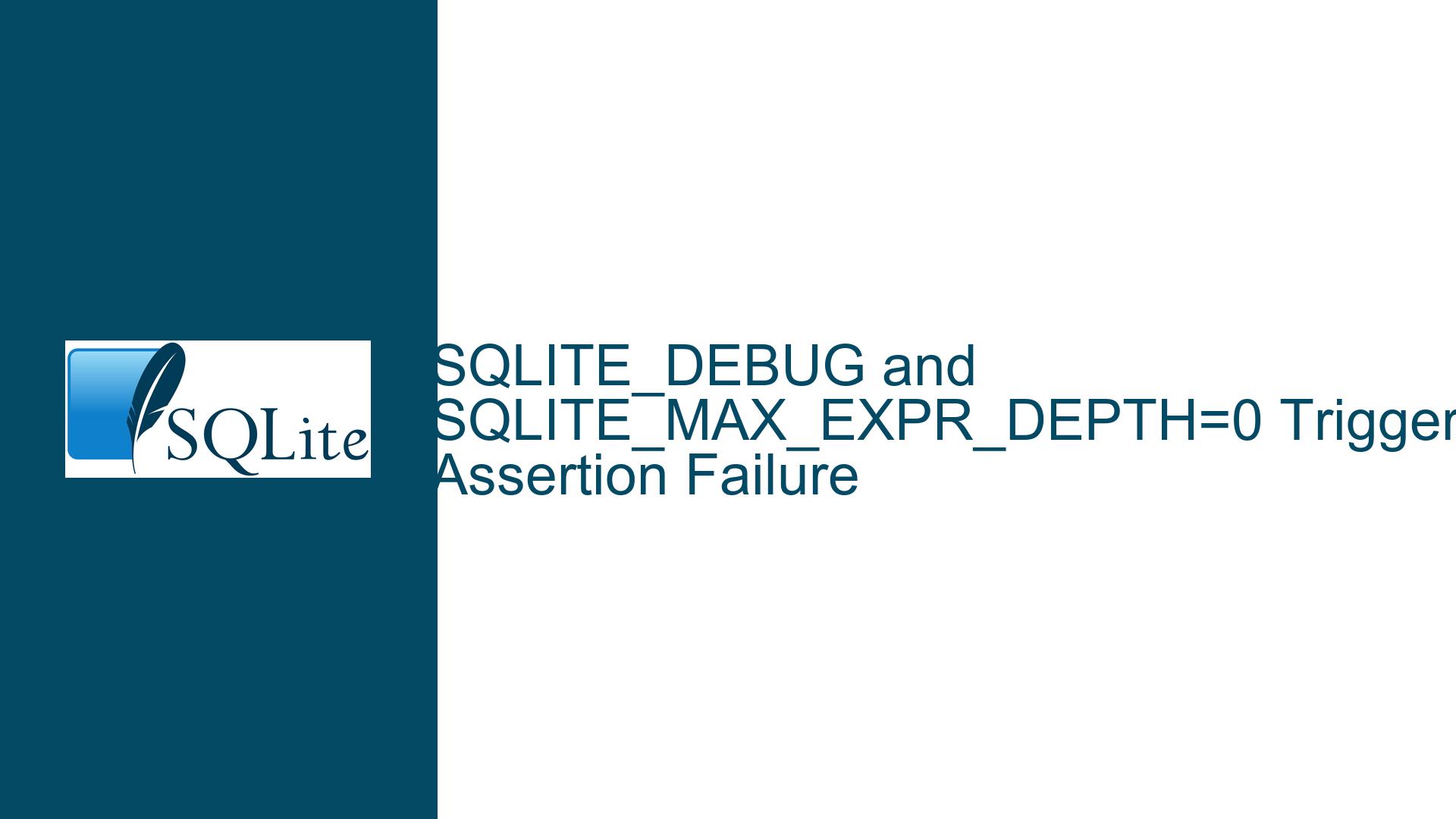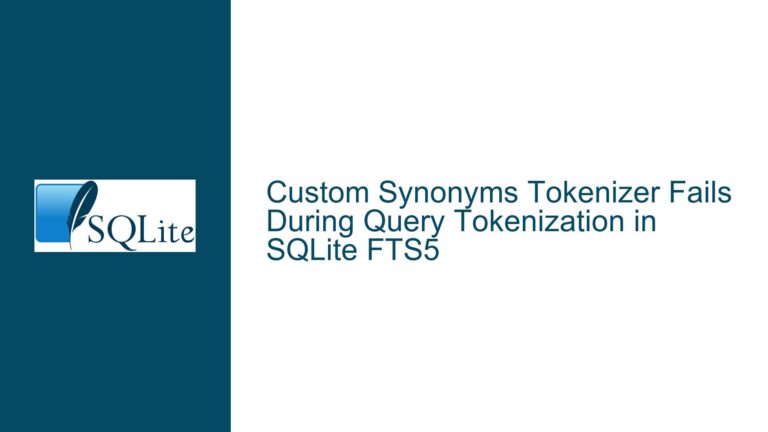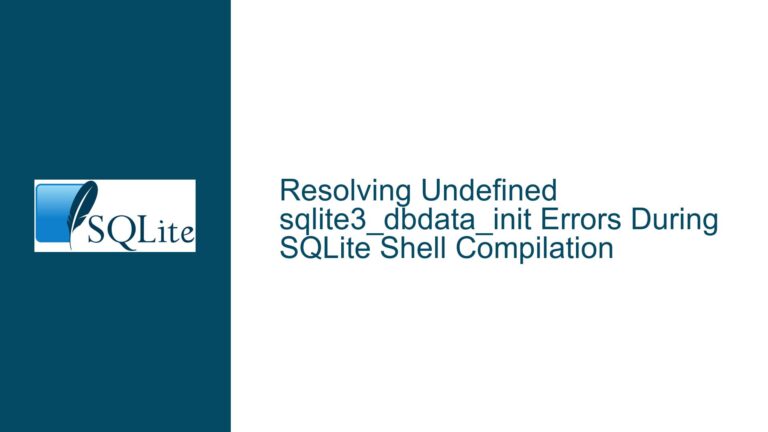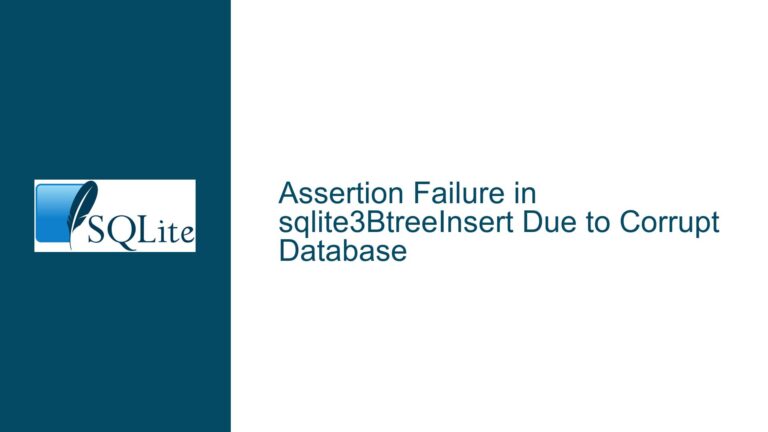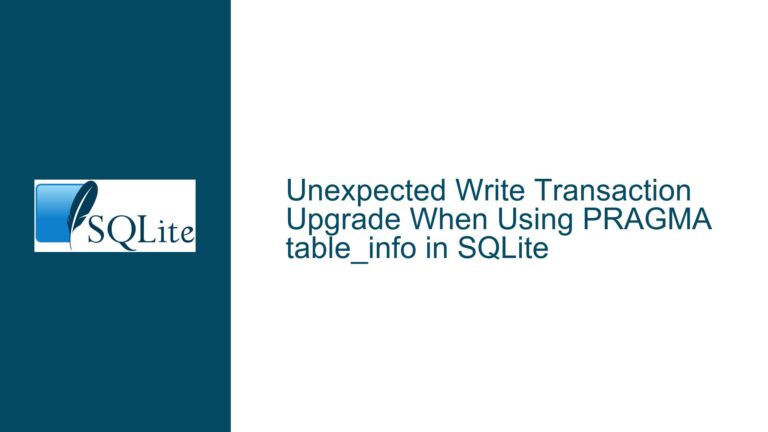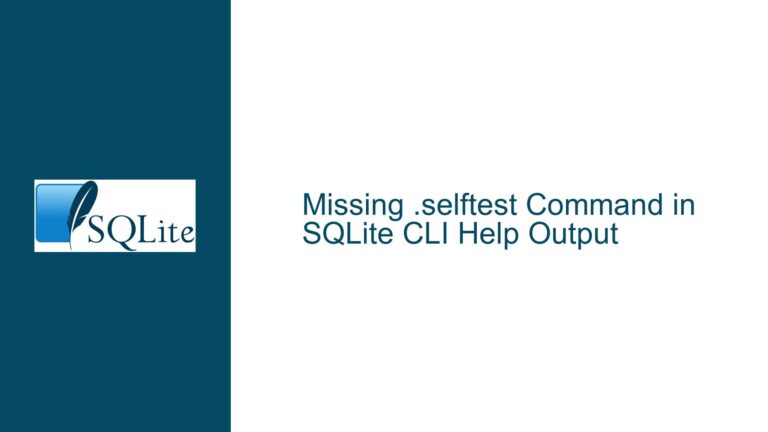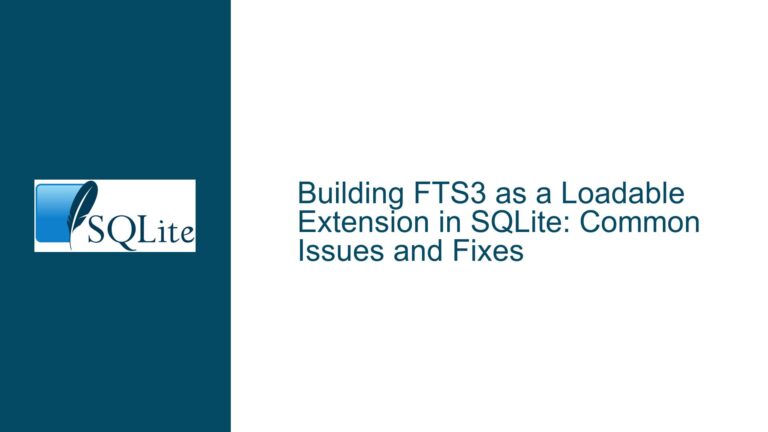SQLITE_DEBUG and SQLITE_MAX_EXPR_DEPTH=0 Trigger Assertion Failure
SQLite Assertion Failure in sqlite3ExprListFlags with SQLITE_MAX_EXPR_DEPTH=0
When SQLite is compiled with the SQLITE_DEBUG and SQLITE_MAX_EXPR_DEPTH=0 options, an assertion failure occurs in the sqlite3ExprListFlags function. This failure manifests during the execution of specific test cases, such as misc1.test, and results in a core dump. The assertion failure specifically points to a null pointer dereference in the expression handling logic, where the function expects a valid pExpr pointer but encounters a null value instead.
The issue arises due to an edge case in the SQLite codebase where the combination of SQLITE_DEBUG and SQLITE_MAX_EXPR_DEPTH=0 triggers an unhandled condition. The SQLITE_MAX_EXPR_DEPTH=0 option disables the maximum expression depth limit, which is intended to prevent excessively complex expressions from causing stack overflows or other resource exhaustion issues. However, when this option is set to zero, the code fails to properly handle certain expressions, leading to the assertion failure.
The assertion failure is not merely a cosmetic issue; it indicates a deeper problem in the expression evaluation logic. Specifically, the sqlite3ExprListFlags function assumes that all expressions passed to it are non-null, but this assumption is violated when SQLITE_MAX_EXPR_DEPTH=0 is set. This violation occurs because the expression depth limit is used as a safeguard to prevent invalid or overly complex expressions from being processed. When this safeguard is removed, the code encounters expressions that it cannot handle, resulting in the null pointer dereference.
Interplay Between SQLITE_DEBUG and SQLITE_MAX_EXPR_DEPTH=0
The root cause of the assertion failure lies in the interaction between the SQLITE_DEBUG and SQLITE_MAX_EXPR_DEPTH=0 compile-time options. The SQLITE_DEBUG option enables additional debugging checks and assertions in the SQLite codebase, which are designed to catch programming errors and invalid states. These assertions are typically harmless in production builds but can reveal hidden issues when enabled.
The SQLITE_MAX_EXPR_DEPTH=0 option, on the other hand, disables the maximum expression depth limit. This limit is a safety mechanism that prevents the SQLite engine from processing expressions that are too deeply nested or complex. By setting this option to zero, the limit is effectively removed, allowing expressions of arbitrary depth to be processed. However, this also means that the code must be able to handle expressions that would otherwise be rejected due to their complexity.
When both options are enabled, the debugging assertions in the sqlite3ExprListFlags function are triggered because the code encounters expressions that it does not expect to handle. Specifically, the function assumes that all expressions passed to it are non-null, but this assumption is violated when SQLITE_MAX_EXPR_DEPTH=0 is set. This violation occurs because the expression depth limit is used as a safeguard to prevent invalid or overly complex expressions from being processed. When this safeguard is removed, the code encounters expressions that it cannot handle, resulting in the null pointer dereference.
The issue is further compounded by the fact that the SQLITE_DEBUG option enables additional checks and assertions that are not present in production builds. These assertions are designed to catch programming errors and invalid states, but they can also reveal hidden issues when enabled. In this case, the assertion failure in sqlite3ExprListFlags is a direct result of the interaction between the SQLITE_DEBUG and SQLITE_MAX_EXPR_DEPTH=0 options.
Fixing the Assertion Failure with PRAGMA journal_mode and Code Updates
The assertion failure caused by the combination of SQLITE_DEBUG and SQLITE_MAX_EXPR_DEPTH=0 can be resolved by applying a patch to the SQLite codebase. The patch addresses the underlying issue by ensuring that the sqlite3ExprListFlags function properly handles null expressions when SQLITE_MAX_EXPR_DEPTH=0 is set. This fix involves modifying the expression handling logic to account for the possibility of null expressions and to avoid dereferencing null pointers.
In addition to applying the patch, it is also recommended to use the PRAGMA journal_mode command to ensure that the database is in a consistent state after the assertion failure. The PRAGMA journal_mode command controls the journaling mode used by SQLite, which affects how transactions are logged and recovered. By setting the journal mode to WAL (Write-Ahead Logging), you can improve the reliability and performance of the database, especially in scenarios where assertion failures or other errors occur.
The following steps outline the process of applying the patch and configuring the journal mode:
Apply the Patch: Download the patch from the SQLite source repository and apply it to your local copy of the SQLite codebase. The patch modifies the
sqlite3ExprListFlagsfunction to properly handle null expressions whenSQLITE_MAX_EXPR_DEPTH=0is set. After applying the patch, recompile SQLite with theSQLITE_DEBUGandSQLITE_MAX_EXPR_DEPTH=0options to verify that the assertion failure no longer occurs.Configure the Journal Mode: Use the
PRAGMA journal_modecommand to set the journal mode toWAL. This can be done by executing the following SQL command in your SQLite database:PRAGMA journal_mode=WAL;The
WALmode improves the reliability and performance of the database by allowing multiple readers and writers to access the database simultaneously without blocking each other. This mode also provides better recovery options in the event of a crash or assertion failure.Test the Database: After applying the patch and configuring the journal mode, run the test cases that previously triggered the assertion failure to verify that the issue has been resolved. This includes running the
misc1.testand other relevant test cases to ensure that the database operates correctly under the new configuration.Monitor for Issues: Continue to monitor the database for any signs of instability or unexpected behavior. If additional issues are encountered, review the SQLite error logs and consider enabling additional debugging options to gather more information about the problem.
By following these steps, you can resolve the assertion failure caused by the combination of SQLITE_DEBUG and SQLITE_MAX_EXPR_DEPTH=0 and ensure that your SQLite database operates reliably and efficiently. The patch and journal mode configuration provide a robust solution to the issue, allowing you to take full advantage of the debugging and expression depth options without encountering unexpected errors.
In conclusion, the assertion failure in sqlite3ExprListFlags when using SQLITE_DEBUG and SQLITE_MAX_EXPR_DEPTH=0 is a result of an unhandled edge case in the SQLite codebase. By applying the appropriate patch and configuring the journal mode, you can resolve the issue and ensure that your database operates smoothly. This solution not only addresses the immediate problem but also provides a foundation for handling similar issues in the future.
